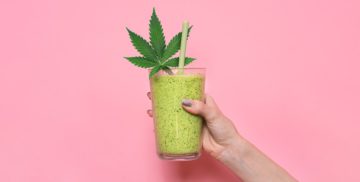More than 10 million people in the UK suffer from arthritis, most notably osteoarthritis and rheumatoid arthritis. Although symptoms may vary, chronic pain is something they all share.
With no known cure, doctors will often prescribe anti-inflammatories and pain killers. But with the latter now resulting in a spreading opioid addiction epidemic, patients and their families are searching for a safer alternative.
CBD oil has been recognised by the World Arthritis Foundation as a potential solution, and industry reports show arthritis patients as one of its top buyers. CBD is an effective treatment for many things but arthritis?
So what exactly is this oil that everyone is talking about? And will using CBD oil for arthritis help relieve some of the chronic pain? Could it be an effective arthritis treatment?
What is Cannabidiol?
Cannabidiol, or CBD as it is more commonly known, is one of more than 113 natural compounds found in the cannabis sativa plant. Unlike THC, cannabidiol is non-intoxicating and as such, regardless of how much is taken, it will not produce a euphoric ‘high’ feeling.
CBD is a dominant part of the plant that has been used medicinally for thousands of years in cultures around the world. In the early part of the 20th-century scientists managed to isolate CBD but it was not until quite recently that they revealed to the world just how impressive it can be.
Click here for a more detailed dive into what CBD is and how it works.
The advantages of Cannabidiol
CBD is a pharmacological wonder, capable of numerous medical benefits such as its anti-anxiety, analgesic, antioxidant, antipsychotic, anticonvulsant, cytotoxic, anti-inflammatory, and antiemetic effects.
It works by interacting with receptors located throughout the human endocannabinoid system. In particular, the brain, central nervous system, and the immune system. But how exactly does it help people suffering from arthritis?
How can CBD oil relieve arthritis pain?
CBD is as complex as the plant it is derived from, but thanks to a substantial amount of scientific research, we now have a firm understanding of how exactly CBD can help relieve pain and inflammation in general and specifically play a role in relieving arthritis pain.
When injury or inflammation occurs (two prominent aspects of arthritis) the body produces an endogenous cannabinoid known as anandamide which reduces the perception of pain.
Unfortunately, this endocannabinoid is rapidly degraded by the enzyme FAAH, but CBD has been shown to inhibit FAAH and slow down anandamide decomposition, thereby prolonging its pain-relieving effects.
Hyperalgesia (increased sensitivity to pain) is synonymous with rheumatoid arthritis and occurs when heat is detected by the body’s vanilloid receptor. It has been demonstrated that CBD can abolish hyperalgesia to thermal stimuli.
CBD also regulates the perception of pain by affecting serotonin receptors which are known to influence pain through spinal processing of nociceptive information.
When CBD lotion is rubbed onto the skin it activates CB2 receptors stimulating the release of β-endorphin which acts on natural opioid receptors in the brain inhibiting the message of pain.
Scientists are really only now beginning to fully understand the molecular and biological mechanisms that occur when CBD is taken into the body. As a result, UK health authorities are playing catch up and patients must look further afield for answers to their pertinent questions particularly regarding dosage. So there is a lack of scientific evidence regarding CBD for arthritis for now at least.
What's the correct CBD oil dosage for arthritis?
There is no official dosage guide from any UK health body as CBD is classed as a food supplement but we are collating all of the available studies worldwide, for our own deep dive. We will continue updating our CBD dosage guide as more information becomes available.
CBD is non-toxic and has been shown to be well tolerated in humans trials with up to 1500 mg taken daily with no side effects. From an economic point of view, recommendations for arthritis patients are thankfully a lot lower than this.
Dr Hervé Damas, a Miami-based physician, says that people with arthritis
“Usually find pain relief when they take 20 to 35 milligrams of CBD daily”.
Dr Sarah Brewer, a medical director and medical nutritionist at UK group ‘Healthspan’ says: “For General well-being, the recommended dose is 10 mg to 200 mg per day as a food supplement.” As there are over 100 different types of arthritis, the best advice is to start small and go slow and the Dr Sulak method is the perfect method for this.
The Dr Dustin Sulak dosing method
Dr Dustin Sulak, a physician in Maine, USA, provides an easy process for finding the correct dosage that is right for you.
Regardless of which method of consumption you choose, vaping, gummies, tincture etc, begin by taking a very small amount (1-5mg) in the morning and after one hour, ask yourself the following 3 questions:
- How easy is it to breathe?
- How comfortable and calm does your body feel?
- How easy is it for you to smile naturally?
You then rate your scores from 1 – 10 and do this every hour.
If your scores are the same after the first hour then slowly increase your dose and rate yourself again using the same 3 questions.
Continue to do this until you feel a noticeable difference.
Eventually, you will reach the stage where increasing the dosage does not result in higher subjective scores implying you have found your optimum dosage.
How many times a day you dose will be dependent on the severity of your pain but most people go for 2-3 times.
How To Use CBD Oil To Relieve Arthritis Pain?
People with arthritis come from every walk of life and live with differing levels of infirmity. Thankfully there are several different ways to take cannabidiol including:
- Orally
- Inhalation
- Topically
- Rectally
- Intravenously
People with arthritis tend to use two methods in conjunction with each other.
A CBD topical should be applied directly to the site of chronic pain to work on that specific area while any other CBD product will enter the circulatory system so it can get to work targeting receptors in the body.
What Does The Science Say?
In a human double-blind, randomised, placebo-controlled study, researchers from the Royal National Hospital for Rheumatic Diseases showed that Sativex (CBD & THC) produced statistically significant improvements in pain relief on movement, pain relief at rest, quality of sleep, and activity of the disease.
Research showed that transdermal application of CBD reduced inflammation and pain-related behaviours in animals with arthritis. The researchers from the University of Kentucky stated that
“Transdermal CBD gel significantly reduced joint swelling, limb posture scores as a rating of spontaneous pain, immune cell infiltration and thickening of the synovial membrane in a dose-dependent manner.”
Nonsteroidal anti-inflammatory drugs (NSAIDs) are used to reduce pain and inflammation but have been linked with COX-1 inhibition (gastrointestinal ulcers and bleeding) COX-2 inhibition (myocardial infarction and cerebrovascular accidents). Eminent scientist Ethan Russo in his 2008 paper states that CBD inhibits neither enzyme at pharmacologically relevant doses.
In a study of animals with Osteoarthritis (OA), researchers concluded that CBD may be a safe therapeutic option to treat OA pain locally as well as block the acute inflammatory flares that drive disease progression and joint neuropathy.
For people looking to try CBD, what options do they have?
Types Of CBD Oil Products
Thankfully due to CBD’s incredible popularity, manufacturers have responded to demand by infusing it into a whole host of products.
CBD Oil Tincture
Tinctures are something most people will be familiar with. CBD drops are placed under the tongue using a pipette inside the bottle. As CBD is a very dense liquid it is added to a carrier oil (olive oil, MCT, etc) to lessen its viscosity for easier application.
CBD tinctures come in a wide range of strengths and flavours and each bottle will tell you exactly how much is in each drop which is perfect for precise dosing.
If at all possible choose a tincture that comes in a ‘hemp seed oil’ carrier. This oil contains the optimum amount of essential oils omega 3 and 6, ideal for healthy skin.
CBD oil capsules
Just like a regular tablet, these are tasteless, easy to swallow and come in either gelatin or a vegetarian option.
Ideal for precise dosing and, like tinctures, come in varying strengths.
CBD Oil e-liquid or flower
Vaping is the method of heating CBD (e-liquid or flower) in an electronic device and breathing it into the lungs. This is ideal for anyone looking for immediate relief as the lungs have a wide surface area allowing for rapid pulmonary absorption resulting in a fast onset of effects.
Neither contain nicotine and are non-addictive. As no combustion occurs (compared to smoking), no toxins are created.
CBD Oil topical solutions
CBD Topicals are lotions, balms and transdermal patches that can be applied directly onto the site of pain to relieve chronic pain at that juncture. CBD topicals do not enter the circulatory system and so it is recommended to use topicals in conjunction with any of the other methods to get full benefits.
CBD edibles
Edibles are great for people who may dislike the taste of CBD oil. They are available in a wide range of products including sweets, mints, teas, and more. They take a little longer (an hour) to take effect but it's likely that you will get relief from your arthritis symptoms for longer than other methods.
The best CBD product for Arthritis pain & how to choose
A wide variety of products offers something for everyone but it can be a little overwhelming at first. Our recommendation for people with arthritis is a topical ointment to apply to particularly sore joints or areas of the body giving trouble.
At the same time, you should choose one of the other options for getting CBD directly into the blood system. For immediate relief vaping is your best option as it offers instantaneous effects.
There are thousands of products to choose from but to narrow it down there are a couple of important things to look out for.
Things to consider when buying CBD Oil
CBD is currently in an unregulated market given its classification as a food supplement (although it is considered medicine when sold as the pharmaceutical product epidiolex or Sativex) so it is very important to only purchase from reputable suppliers.
To guarantee you are purchasing quality, untainted, premium CBD oil you need to ask:
- Is it lab tested?
- Is it full-spectrum?
- Is it sourced responsibly?
Is it lab tested? – Legitimate manufacturers can provide independent, 3rd party lab test analysis reports. These will show the quantity of CBD and other minor cannabinoids so you can be sure that you’re getting what you paid for.
Is it full-spectrum? – CBD does not work alone but together with the other cannabinoids and terpenes (provides the smell) and together they give a synergistic effect known by scientists as the entourage effect. Full-spectrum CBD oil will contain all the ‘ingredients’ required for full effect.
Is it sourced responsibly? – It is of great importance that you only choose CBD oil that was extracted from organically grown cannabis.
Cheap CBD oil often comes from cannabis plants sprayed with pesticides, herbicides and synthetic fertilisers which are dangerous to your health. Look for proof of organic origins.
Premium manufacturers such as London-based ‘Canavape’ will provide all of the above.
So now that the product has been chosen, people need to know if there are any side effects from using CBD oil.
Side Effects
CBD has been shown to be well tolerated in humans. Side effects in studies are rare but when they do occur they are described as being mild to moderate, such as:
- Tiredness
- Diarrhoea
- Changes in appetite/weight
- Drug on drug interaction
CBD can potentially interact with enzymes in the liver (similar to grapefruit juice). Anyone on medication should check with their doctor prior to starting CBD oil as you may need to lower your pharmaceutical medication as a result.
Is CBD Legal?
CBD is legal in the UK as it comes from the cannabis plant (also known as the hemp plant) that contains less than 0.2% of the intoxicating THC.
Is CBD From The Marijuana Plant?
The official name for this plant is cannabis but over the years numerous other slang names have appeared. One such name is marijuana. This name is generally used to describe the cannabis plant that has a high content of THC which will bring about a euphoric feeling.
CBD oil in the UK ONLY comes from cannabis (hemp) plants containing less than 0.2% THC and therefore will never get you high.
CBD Oil For Rheumatoid Arthritis – Is It Available On The NHS?
CBD oil is not available on the NHS but can be purchased without a prescription on sites such as www.cbdvillage.co.uk. You should always talk to your doctor before trying CBD oil, however.
The Key Takeaways
Over 500 studies in the National Library of Medicine showcase the incredible potential of this compound to help play a role in treating arthritis and an array of other afflictions and as such CBD oil should be considered as a safer treatment option.
CBD is non-toxic and dosage ranges are generally recommended in the 25-200 mg range yet it has been clinically tolerated up to 1500 mg.
More human studies are evidently required to truly determine the efficacy and efficiency of CBD but existing research is already backing up what advocates have been telling us for years; CBD oil for arthritis may be the solution we have all been looking for.










